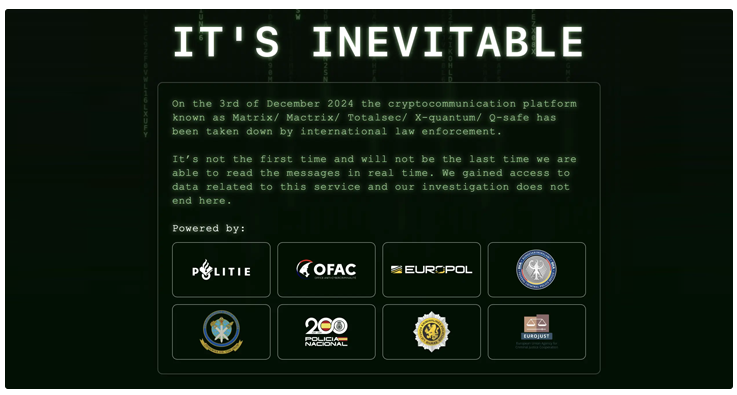Europol Shuts Down MATRIX Service
Europol’s takedown of the encrypted messaging service MATRIX and the subsequent law enforcement operations have highlighted significant efforts by international authorities to disrupt illegal communication networks and cybercrime activities. Here’s a breakdown of key developments from the operations:
You might be interested in: Cyber Security Analyst: What They Do?
MATRIX Encrypted Messaging Service Takedown
MATRIX was an encrypted messaging service designed for illicit activities, built and used by criminals for coordinating serious criminal enterprises, including drug trafficking, weapons trade, and money laundering. The service was taken down after a multi-year investigation initiated in 2021. The inquiry stemmed from the discovery of MATRIX on the phone of a criminal convicted for the murder of Dutch journalist Peter R. de Vries.
- Criminal Activities: Authorities intercepted over 2.3 million messages in 33 languages related to international crime.
- Operations: The takedown was part of a coordinated effort by law enforcement from France, the Netherlands, Italy, Lithuania, and Spain under the operation name Passionflower.
- Technical Details: MATRIX was described as being technically more complex than previous encrypted platforms like Sky ECC and EncroChat. It utilized more than 40 servers across different countries, with key infrastructure based in France and Germany.
- Arrests & Seizures: The operation resulted in the arrest of several suspects, including the 52-year-old Lithuanian owner of the service, and the confiscation of over €645,000 in cash and cryptocurrency. Authorities also seized over 970 mobile phones and several vehicles.

Crimenetwork Marketplace Takedown
In another major development, Europol and the German Federal Criminal Police (BKA) took down Crimenetwork, the largest German-speaking cybercrime platform for illegal goods and services. The platform had been operational since 2012 and catered to over 100,000 users.
- Illegal Transactions: Crimenetwork facilitated the exchange of illicit goods such as stolen data, drugs, and forged documents. It handled over $100 million in transactions, with a significant portion paid in cryptocurrencies like Bitcoin and Monero.
- Arrest: One of the platform’s administrators, known as Techmin, was arrested. Authorities are still investigating other members of the network.
Satellite DDoS Attacks in South Korea
In South Korea, law enforcement arrested six individuals involved in embedding distributed denial-of-service (DDoS) functionality into satellite broadcasting receivers. These devices were covertly equipped to launch DDoS attacks on command, affecting 240,000 devices.
- Method: The DDoS functionality was either pre-installed or distributed via firmware updates to unsuspecting devices.
- Impact: The individuals acted at the request of a client, and the distributed DDoS feature posed a serious threat to network infrastructure.
Impact on the Criminal Landscape
The takedowns of MATRIX and Crimenetwork, along with the crackdown on DDoS-enabled devices, show how authorities are adapting to the evolving landscape of cybercrime and encrypted communication tools. As law enforcement disrupts major criminal communication channels, criminals are shifting towards new, less-known platforms, creating a more fragmented and challenging environment for authorities.
Broader Trend: Fragmentation of Criminal Networks
Europol noted that the encrypted communication landscape has become more fragmented as major services like Sky ECC, EncroChat, and Exclu have been dismantled. Criminals are increasingly turning to new platforms with varying levels of anonymity, making it harder for law enforcement to track illicit activity. However, the recent success in cracking down on large-scale platforms and uncovering massive networks shows that authorities remain vigilant and capable of adapting to emerging technologies used by criminals.
Conclusion
The recent coordinated operations underscore the global and evolving nature of law enforcement efforts to combat cybercrime. The dismantling of encrypted messaging services and criminal marketplaces is a major step in disrupting organized crime, but it also reveals the complex and adaptive nature of criminal networks relying on technology to evade detection.
